
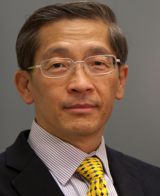
|
Jay Lee - University of
Cincinnati - USA
|
| Theme:
Recent Advances and Trends of Cyber-Physical Systems
and Big Data Analytics in Industrial Informatics
Systems
In today’s competitive business environment,
companies are facing challenges in dealing with big data
issues for rapid decision making for improved
productivity. Many manufacturing systems are not ready
to manage big data due to the lack of smart analytics
tools. Germany is leading a transformation toward 4th
Generation Industrial Revolution (Industry 4.0) based on
Cyber-Physical System based manufacturing and service
innovation. As more software and embedded intelligence
are integrated in industrial products and systems,
predictive technologies can further intertwine
intelligent algorithms with electronics and tether-free
intelligence to predict product performance degradation
and autonomously manage and optimize product service
needs.
|
|
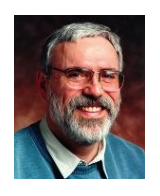 |
Bran
Selic
- Malina Software Corp. - Canada Bran Selic is President of Malina Software Corp., a Canadian software consultancy. He is also Director of Advanced technology at Zeligsoft Limited in Canada and a Visiting Scientist at Simula Laboratories in Norway. In 2007, Bran retired from IBM Canada, where he was an IBM Distinguished Engineer, responsible for setting IBM’s strategy for software development tools. In addition, he is an adjunct professor of computer science at the University of Toronto, as well as a guest lecturer and researcher at the University of Sydney (Australia) and at INSA (Lyon, France). With close to 40 years of practical experience in designing and implementing large-scale industrial software systems, Bran has pioneered the application of model-driven development methods in real-time and embedded applications. In this domain, he has led numerous research projects, authored and edited several textbooks and numerous technical papers and chaired major conferences dedicated to these problems. He is one of the principal contributors to several technical standards, including chairing the committee responsible for the widely used UML 2 modeling language. |
| Theme:
Model-Based Software Engineering in Industry:
Revolution, Evolution, or Smoke? Software
developers are incessantly inundated with wave upon wave
of offered solutions to their many pains (pains, which,
unfortunately, are ultimately felt by their clients):
third generation languages, object oriented programming,
CASE tools, aspects, components, programming frameworks,
extreme programming, agile methods, to name just a few.
Some of these have indeed had dramatic impacts on how
software is developed, while others have proved mere
passing fads, never fulfilling the potential claimed for
them. One of the more recent entries in this multitude
is model-based software engineering (MBSE) also referred
to sometimes as model-driven development. From its
emergence in the 1990’s, this approach to software
development along with its accompanying technologies
have been promoted by their advocates as game changers,
promising quantum leaps in productivity and product
quality. Following the initial excitement and hype
generated around MBSE, its position in the limelight is
now slowly fading, displaced by more recent cure-alls.
While MBSE is being used in some enterprises, it is far
from being the dominant software development paradigm
that its proponents had hoped for. For many software
professionals, its relevance and impact are unclear at
best.
In this talk, we first examine the essential precepts of MBSE and the value proposition claimed for it. Next, in order to understand the reality behind it – as opposed to the hype, we review current experience with the use of MBSE in industry, based on a systematic and thorough survey of published data. We conclude with a critical assessment of the actual impact that MBSE has had to date and what the future might hold for it. |
|
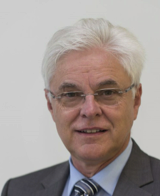 |
Detlef Zühlke
Prof. Zuehlke received his MS in Electrical
Engineering and Applied Computer Sciences in 1976 and
his PhD in Industrial Automation in 1983 from RWTH
Aachen Germany. In 1985 he joined LUFTHANSA German
Airlines and was responsible as a general manager for
the maintenance operation Frankfurt. In 1991 Dr. Zuehlke
became a Professor for Industrial Automation and Head of
the Institute for Production Automation -pak- at the
University Kaiserslautern. He is also the scientific
director of the research institute on innovative factory
systems (IFS) as part of the German Research Center for
Artificial Intelligence DFKI Kaiserslautern. Since 2005
he is the chairman of the executive board of the
“smartFactory-KL” a demonstration and research factory
for innovative technologies funded by many industrial
and academic partners.
He is author of several books. In IFAC he is member of the technical board and chairs the CC4 on Mechatronics, Robotics and Components. His research interest is in factory control architectures, ICT in industrial environments and human-machine-systems for industrial applications. |
| Theme:
Industry 4.0 Initiative
Our industries are facing a period of major challenges.
The customer demand for new products is coming at ever
shorter intervals and is increasingly dependent on
customized products that must be adapted for individual
preferences. These challenges are evident in today's
mobile phone market. Product life cycles of 6-9 months
are the rule more frequently now and this is accompanied
by a steady increase in the functionality of the
products. Although enormous performance improvements in
computer-aided technology (CAx) during the past 10
years have allowed the design and planning phases to be
adapted to the different limiting conditions, a similar
breakthrough is still awaited in the actual
manufacturing technologies.
For solving this dilemma we can learn from the field of information and communication technologies. Computers are getting so small they seem to vanish inside nearly all of our technical devices. Beyond all this, things communicate in a world-wide network: the Internet. When we contemplate following this path into the future, we find that nearly all the things of everyday life will become smart nodes within a global network. This phenomenon is called the Internet-of-Things (IoT). This trend will certainly find its way also into industrial production. The strong bias of the electro-technical and hierarchical world of factory automation will transition to smart factory networks, which increasingly benefit from the advances in Information and Communication Technology (ICT) and computer sciences. This will lead us to smart production processes in smart factories. In Germany, this vision is called “the fourth Industrial Revolution or, in shorthand, Industrie 4.0". This work will present the Industrie 4.0 paradigm and discuss the impact on future production. |
|
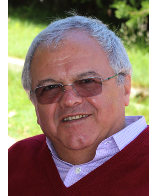 |
Okyay Kaynak
Okyay Kaynak received the B.Sc. degree with
first class honors and Ph.D. degrees in electronic and
electrical engineering from the University of
Birmingham, UK, in 1969 and 1972 respectively.
After spending some years in industry, he joined the Department of Electrical and Electronics Engineering, Bogazici University, Istanbul, Turkey in 1979, where he is presently a Full Professor. He has hold long-term (near to or more than a year) Visiting Professor/Scholar positions at various institutions in Japan, Germany, U.S., Singapore and China. Dr. Kaynak is a fellow of IEEE. His current research interests are in the fields of intelligent control and mechatronics. He has served on many committees of IEEE and was the president of IEEE Industrial Electronics Society during 2002-2003. He was the founding Editor-in Chief on IEEE Transactions on Industrial Informatics. Currently he is the Editor-in-Chief of Transactions on IEEE/ASME Transaction on Mechatronics. |
| Theme:
The Exhilarating Journey from Industrial Electronics
to Industrial Informatics
This presentation will discuss the challenges that face
industry in the 21st century. An assessment of the past
will be presented, discussing the profound technological
changes that have taken place during the last 2 decades,
especially the changes observed in the manufacturing
industry. The paradigm change from industrial
electronics to industrial informatics will be pointed
out to. This will be followed by a look at the evolution
of the manufacturing paradigms. In the closing parts of
the presentation, the state-of-the-art reached in
industrial informatics will be given with examples and a
perspective on the future will be presented, pointing
out the challenges that the manufacturing industry will
have to face by the end of the next decade.
|
|
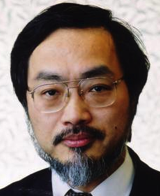 |
Toshio Fukuda
Toshio Fukuda graduated from Waseda
University, Tokyo, Japan in 1971 and received the
Master of Engineering degree and the Doctor of
Engineering degree both from the University of Tokyo,
in 1973 and 1977, respectively. He joined the National
Mechanical Engineering Laboratory in Japan in 1977,
the Science University of Tokyo in 1981, and then
joined Department of Mechanical Engineering, Nagoya
University, Japan in 1989.
He is currently one thousand talented foreign Professor at BIT. He is Professor Emeritus of Nagoya University, having worked as Professor of Dept. of Micro and Nano System Engineering and Dept. of Mechano-Informatics and Systems, Nagoya University, Japan and as director of Center for Micro and Nano Mechatronics. He has been working as Professor of Shenyang University of Technology, Institute of Automation, Chinese Academy of Science, Russell Springer Chaired Professor at UC Berkeley, Seoul National University, Advisory Professor of Industrial Technological Research Institute and etc. He is mainly engaging in the research fields of intelligent robotic system, micro and nano robotics, bio-robotic system, and technical diagnosis and error recovery system. He was the President of IEEE Robotics and Automation Society (1998-1999), Director of the IEEE Division X, Systems and Control (2001-2002), the Founding President of IEEE Nanotechnology Council (2002-2005), and Region 10 Director (2013-2014). He was Editor-in-Chief of IEEE/ASME Trans. Mechatronics (2000-2002). He was the Founding General Chairman of IEEE International Conference on Intelligent Robots and Systems (IROS) held in Tokyo (1988). He was Founding Chair of the IEEE Workshop on Advanced Robotics Technology and Social Impacts (ARSO, 2005), Founding Chair of the IEEE Workshop on System Integration Internatioal (SII, 2008), Founding Chair of the International Symposium on Micro-Nano Mechatronics and Human Science (MHS, 1990-2012). He has received many awards such as IEEE Eugene Mittelmann Achievement Award (1997), IEEE Third Millennium Medal (2000) , IEEE Robotics and Automation Pioneer Award (2004), IEEE Transaction Automation Science and Engineering Googol Best New Application Paper Award (2007), George Saridis Leadership Award in Robotics and Automation (2009), IEEE Robotics and Automation Technical Field Award (2010). He received the IROS Harashima Award for Innovative Technologies (2011) and Friendship Award of Liaoning Province PR China (2012). IEEE Fellow (1995). SICE Fellow (1995). JSME Fellow (2002), RSJ Fellow (2004), VRSJ Fellow (2011) and member of Science Council of Japan (2008-), and Academy of Engineering of Japan (2013-). |
| Theme:
Mutli-scale Robotics
This talk is an overview of the Multi-scale robotics,
based on the Cellular Robotics System, which is the
basic concept of the emergency of intelligence in the
multi-scale way from Cell Level to the Organizational
Level, proposed 30 years ago. It consists how the system
can be structured from the individual to the
group/society levels in analogy with the biological
system. It covers with the wide range of challenging
topics:
1. Individual robot level, Brachiation Robots and Multi-locomotion robots, medical robotics and simulator, 2. Cooperation and competition of the multiple robotics system 3. Distributed autonomous robotic system 4. Micro and nano robotics system 5. Bio analysis and synthesis : bio-robotics system |
|
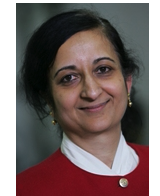 |
Anuradha Annaswamy
Dr. Anuradha Annaswamy received the Ph.D.
degree in Electrical Engineering from Yale University
in 1985. She has been a member of the faculty at Yale,
Boston University, and MIT where currently she is the
director of the Active-Adaptive Control Laboratory and
a Senior Research Scientist in the Department of
Mechanical Engineering. Her research interests pertain
to adaptive control theory and applications to
aerospace and automotive control, active control of
noise in thermo-fluid systems, control of autonomous
systems, decision and control in smart grids,
co-design of control and distributed embedded systems,
and CPS-design of transportation systems. She is the
author of a graduate textbook, over a hundred journal
publications, and numerous conference publications.
She is the co-editor of the IEEE CSS report on Impact
of Control Technology: Overview, Success Stories, and
Research Challenges, 2011, and the coeditor of the
IEEE publication “IEEE Vision for Smart Grid Control:
2030 and Beyond,” 2013.
Dr. Annaswamy has received several awards including the George Axelby and Control Systems Magazine best paper awards from the IEEE Control Systems Society, the Presidential Young Investigator award from the National Science Foundation, the Hans Fisher Senior Fellowship from the Institute for Advanced Study at the Technische Universität München in 2008, and the Donald Groen Julius Prize for 2008 from the Institute of Mechanical Engineers. Dr. Annaswamy is a Fellow of the IEEE and a member of AIAA. She is currently serving as the Vice President for Conference Activities in the Executive Committee of the IEEE Control Systems Society. |
| Theme:
Smart Grid – A Quintessential Illustration of an
Energy Cyberphysical System
The 21st century is witnessing a prodigious change in
energy landscape with the arrival of renewable sources
such as wind and solar, global concerns of
sustainability and greenhouse gas emissions, and
dwindling resources of fossil fuels. The obvious
advantages of reduced operational costs and emissions,
obtainable with renewables such as off-shore wind-farms
and solar-panels on individual buildings, are
accompanied with the challenges of intermittency and
distributed availability. Smart Grid is a transformative
global imperative that can meet these challenges via
using a cyber-physical infrastructure that plans,
controls, and delivers power to meet demand over an
entire region.
This talk will present the key features of the cyberphysical infrastructure that can engender such a transformation. These features include (a) Transactive Control, an architecture that enables efficient participation of various heterogeneous stakeholders in the process including the renewable energy producers, demand response constituents, and aggregators while ensuring reliable power delivery, (b) Demand Response, an emerging paradigm where consumers dial-in their demand in response to strategically placed incentives, (c) Heterogeneous Storage mechanisms with varying authority, constraints, and ramp-rates , and (d) Cyber-physical Resilience, the ability to provide optimal recovery in the presence of natural and cyber anomalies. In this talk, various scenarios that exemplify the CPS infrastructure, the associated research challenges, and recent illustrations will be presented. |
